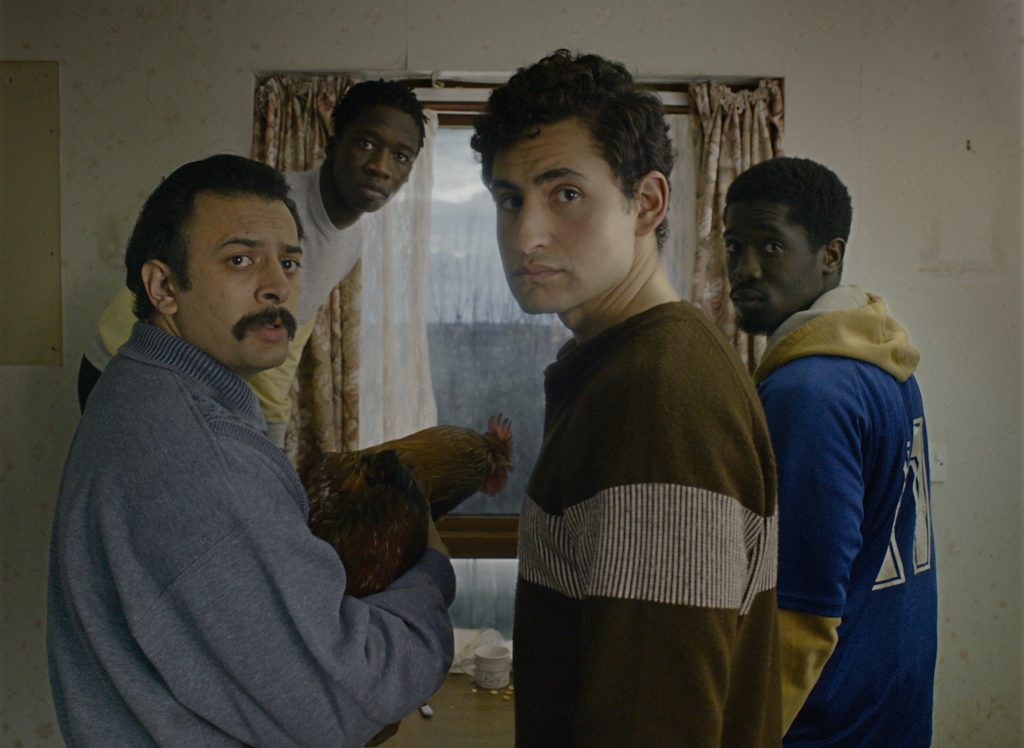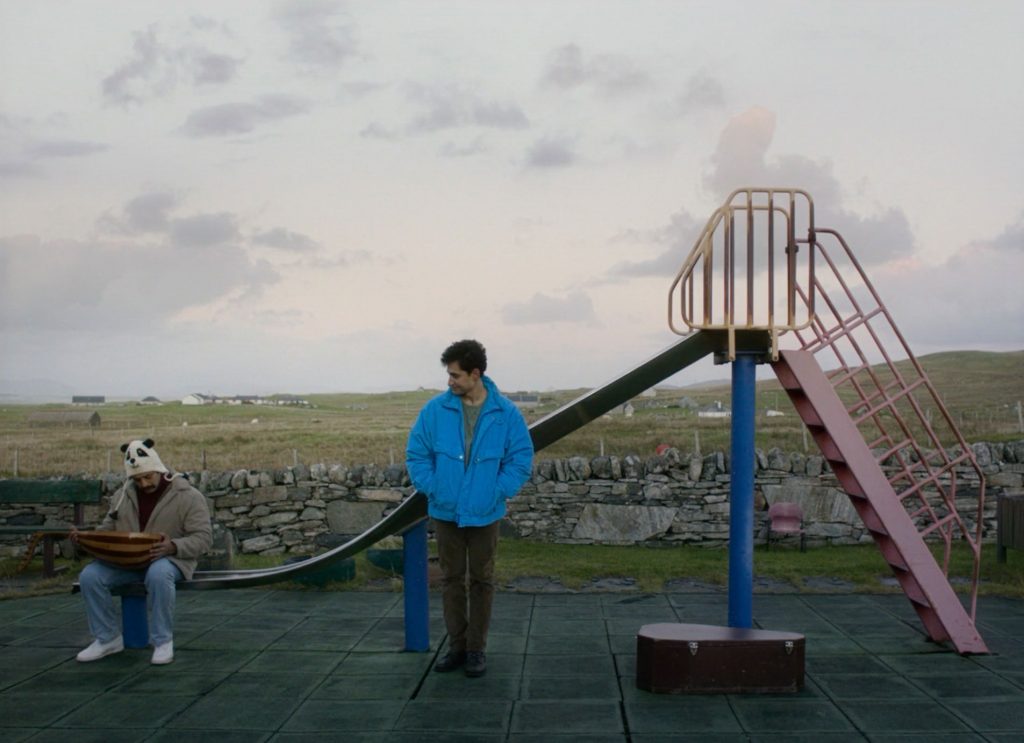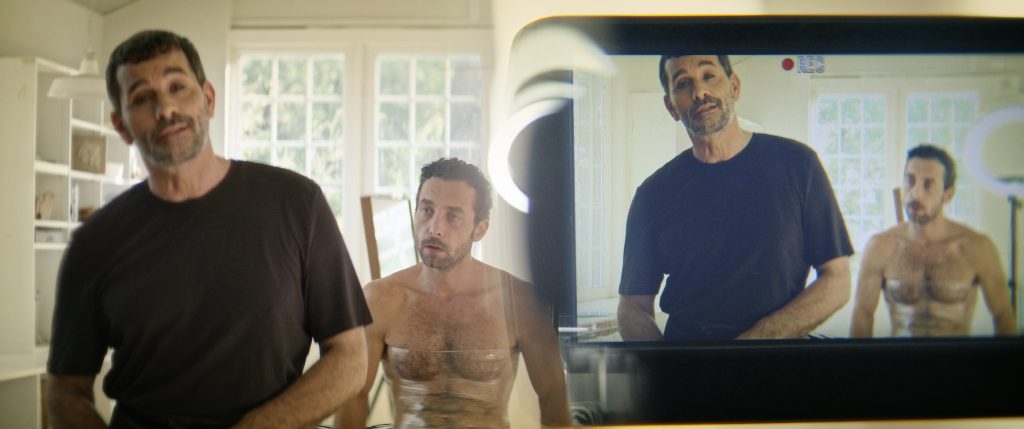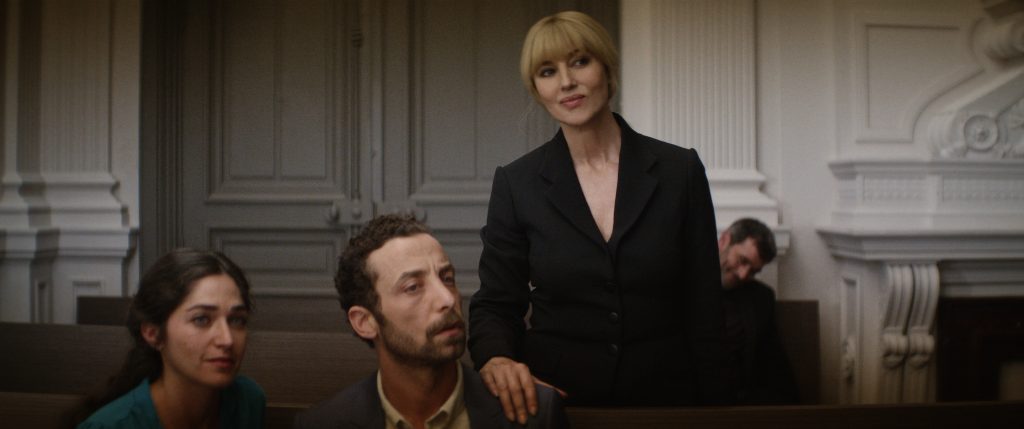April 30, 2021
by Carla Hay

Directed by Ben Sharrock
Some language in Arabic with subtitles
Culture Representation: Taking place in an unnamed part of Scotland, the dramedy film “Limbo” features a racially diverse cast of characters (Arabic, African and white British people) representing refugees, the working-class and middle-class.
Culture Clash: A Syrian refugee meets and befriends other refugees in a settlement in Scotland, as they wait to find out if they will be officially given asylum in the United Kingdom.
Culture Audience: “Limbo” will appeal primarily to people interested in quirky films about the refugee experience from the perspective of a Syrian character.

Writer/director Ben Sharrock’s “Limbo” looks a lot like what Miranda July would do if she made a movie about a Syrian refugee in Scotland. It’s a movie that is best enjoyed by people who have tolerance for non-stop quirkiness with some angsty undertones. In other words, “Limbo” isn’t for everyone, but it’s unusual enough to make a lasting impression on people who see it.
Sharrock’s influences from filmmaker July are all over “Limbo,” beginning with the opening scene, which takes place in an adult-education classroom for refugees at a government-run refugee settlement area in an unnamed part of Scotland. The lesson for the day is written on the chalkboard: “Class Cultural Awareness 101: Sex: Is a Smile an Invitation?” The class’s two middle-aged instructors Helga (played by Sidse Babett Knudsen) and Boris (played by Kenneth Collard) are awkwardly dancing with each other to Hot Chocolate’s 1982 song “It Started With a Kiss,” as a way of demonstrating Western mating rituals.
Watching this spectacle is a group of about 20 Arabic and African men, some with their mouths open in a gawking “what the hell am I looking at” expression, as you do in quirky movies like this one. This “dance instruction” is supposed to teach the men about sexual harassment boundaries when approaching women. And so, when Boris reaches over to grab Helga’s rear end, she slaps him. And then she says, “Thank you, Boris. You can now take a seat.”
Helga then turns to the class and asks, “Can anyone tell me what Boris did wrong?” A Syrian refugee in his 40s named Farhad (played by Vikash Bhai) raises his hand tentatively. The answer he gives is never shown in the movie, because the scene is supposed to satirize the patronizing way that these refugees are being treated in this nation where they are racial and ethnic minorities. Of course, things such as dancing and etiquette exist in the countries where these men are originally from, but the class is a metaphor for the European colonial mentality that sees people of color from other countries as brutes in need of social training.
One of the students in the class is a Syrian refugee in his late 20s named Omar (played by Amir El-Masry), the story’s protagonist. Omar is a musician who seems like he could have come straight out of a film made by July: He’s morose, very introspective, and he (like many of the characters in “Limbo”) often speaks with longer-than-usual pauses in between sentences.
Before leaving war-torn Syria, Omar was making a name for himself in his local area as a talent oud player. The oud that Omar brought with him to Scotland was given to him by his grandfather, who was a semi-famous musician in Syria. But ever since Omar has been a refugee, he hasn’t been playing the oud. He doesn’t even really want a lot of people in Scotland to know that he’s a musician.
It’s implied that Omar’s passion for playing music has waned because of his traumatic refugee experiences. But in the beginning of the story, one of the main reasons why Omar doesn’t play his oud is because his right arm is in a cast. Eventually, the cast comes off, but he’s still reluctant to play his oud.
At this refugee settlement, Omar shares living quarters with Farhad and two immigrants from Africa: Wasef (played by Ola Orebiyi) and Abedi (played by Kwabena Ansah), who both identify themselves as brothers. Wasef is in his 20s and very cynical, while Abedi is 17 years old and more eager to please. All four of these refugees are waiting to hear if they will be officially granted asylum in the United Kingdom.
Their asylum status will determine if they can find legal employment in the U.K. or if they will possibly deported. Omar originally had plans to go to London to work, but he is stuck in Scotland until he finds out if he will be granted asylum. The refugees are told that the bureaucratic process could take weeks or months. In the meantime, Omar, Farhad, Wasef and Abedi find work at a fishery.
One of the recurring scenarios shown in “Limbo” is the phone calls that Omar makes to his parents, who are living as Syrian refugees in Istanbul, Turkey. Even though Omar and many of the refugees have their own mobile phones, “Limbo” shows the refugees using a single pay phone outside to make calls to their families. It’s never explained why they use this old-fashioned pay phone, but they gather and wait to take turns using this pay phone. Viewers can speculate that it’s supposed to conjures up images of people in prison waiting to use a phone.
During the phone calls to his family, Omar usually speaks to his mother (voiced by Darina Al Joundi), while Omar’s father (voiced by Nayef Rashed) can be heard occasionally joining in the conversation from the background. Omar’s parents, who don’t have names in the movie, are briefly seen in some video footage later in the movie. Shereen Sadiq portrays Omar’s mother, and Hayan Rich portrays his father in this footage.
The biggest insecurity that Omar has when it comes to his family is feeling inadequate compared to his older brother Hamad (played by Sodienye Ojewuyi), who is a soldier in the Syrian civil war. Hamad and Omar are estranged from each other. It’s implied that this estrangement is because Hamad thinks Omar is a coward for not being in the military.
When Omar speaks to his mother on the phone, she always asks Omar if he’s heard from Hamad. The answer is always no, and this type of questioning annoys Omar. It also irritates him when his mother suggests that Omar try to reach out to Hamad. Omar always has to remind his mother that he doesn’t know where Hamad is.
Abedi and Wasef get into some family squabbles too, but not to the extent where they stop talking to each other. Wasef tells Abedi what he thinks of the U.K. government: “You know they put us out here to break us.” Abedi is more willing to assimilate into this new environment than Wasef is. Meanwhile, when Wasef announces that he wants to be a soccer player/footballer, Abedi scoffs at the idea.
As for Farhad, he has a fascination with Fredde Mercury, the lead singer of Queen who died in 1991. Farhad tells Omar how he feels about Mercury: “He’s my hero. He taught me English. We have the same mustache. He’s Zoroastrian like me.” And when Farhad smuggles a chicken into the living quarters, he names the chicken Freddie Mercury.
Farhad and Omar become friends, and Farhad encourages Omar to start playing his oud. However, there’s an underlying understanding that they don’t want to get too close to each other because one person’s immigration status can change. And that could mean leaving the settlement area voluntarily or by government orders. While Omar thinks he might return to Syria one day, Farhad says he never wants to go back. “I can’t be myself there,” Farhad tells Omar, thereby implying that Farhad is gay or queer.
The refugee experiences in the story range from comedic depictions of their adjustments to Western culture to satirical depictions of the ugliness of racism. For example, the four housemates end up getting free DVDs of the sitcom “Friends” from the donation center where they receive supplies, because the DVDs were easier to get than highly coveted cots. The movie shows how they spend time watching the DVDs. In one scene, Abedi and Wasef have a heated argument about the breakup of “Friends” characters Rachel Greene and Ross Geller.
Omar experiences racism when he’s walking down a road and encounters four rude teenagers driving by in a car: Plug (played by Cameron Fulton), Stevie (Lewis Gribben), Cheryl (played by Silvie Furneaux) and Tia (played by Iona Elizabeth Thomson). Stevie says to Omar, “Don’t blow up shite and rape anyone, right?” But after a barrage of Islamaphobic and racist insults, the teens offer Omar a ride because it’s about to rain. And he accepts the ride.
Occasionally, Omar goes to a grocery store that sells sells ethnic food on shelves that are close to empty. At the grocery store, he encounters the Sikh owner Vikram (played by Sanjeev Kohli), who operates the cash register up front. Vikram is one of those movie characters who stares too long at people and talks in that slow cadence that oddball characters have in oddball movies like this one. However, Vikram teaches Omar a few valuable lessons about what are racial/ethnic slurs in Great Britain. These slurs aren’t allowed in Vikram’s store, and he has a list of “banned words” posted on the wall.
The first half of “Limbo” has a more consistent tone than the second half. The latter half of the film takes a significant detour from quirkiness into some heavy emotional family drama for Omar, before sliding back into the eccentric vibe that it had from the start. And there’s some predictable sentimentality in the film. It’s a transition that is a bit clumsy but apparently done to make Omar more of a relatable human being instead of just a two-dimensional “sad sack” character.
Nick Cooke’s cinematography in “Limbo” has some slow, sideways tracking shots that are reminiscent of Wes Anderson movies. And just like a movie from Anderson, “Limbo” has some whimsical production design that invokes the idea of adults in a children’s setting, with splashes of the fantastical. A children’s playground near the settlement area is used in scenes where the adults have conversations. And the promise of seeing northern lights plays a role in a pivotal scene in the movie.
Weirdo films like “Limbo” are an acquired taste. El-Masry does a good-enough job with his performance as the conflicted and somber Omar. However, Ojewuyi’s portrayal of Farhad is the real scene-stealer of the movie. Farhad’s optimism and kooky antics make him more endearing and entertaining to watch than Omar. “Limbo” isn’t a bad movie, but it would’ve been more interesting if Farhad had been the main character.
Focus Features released “Limbo” in select U.S. cinemas on April 30, 2021.


